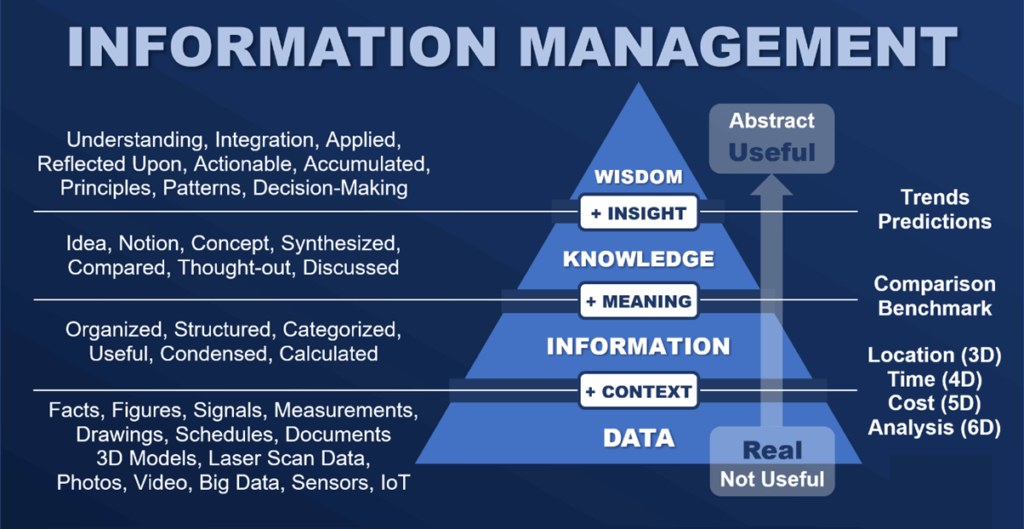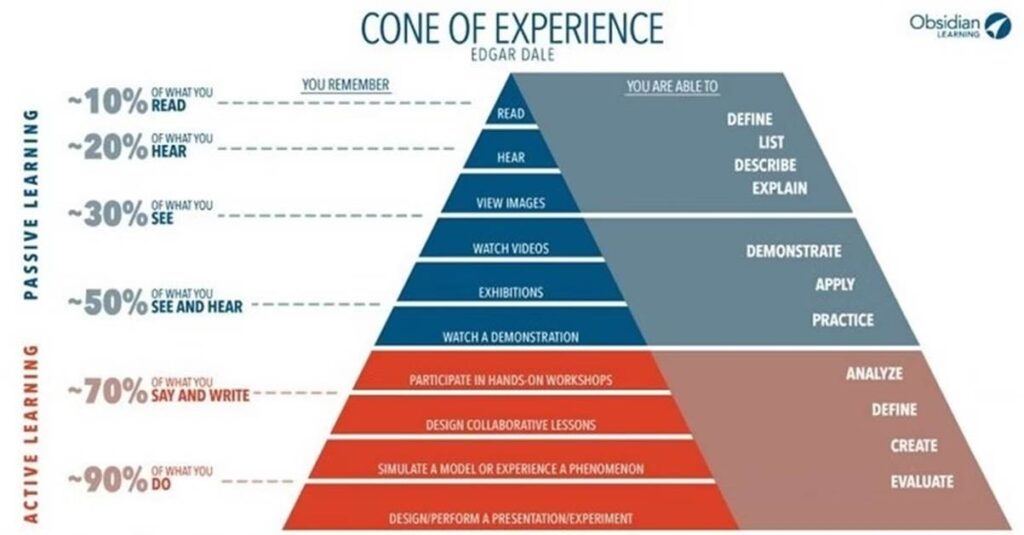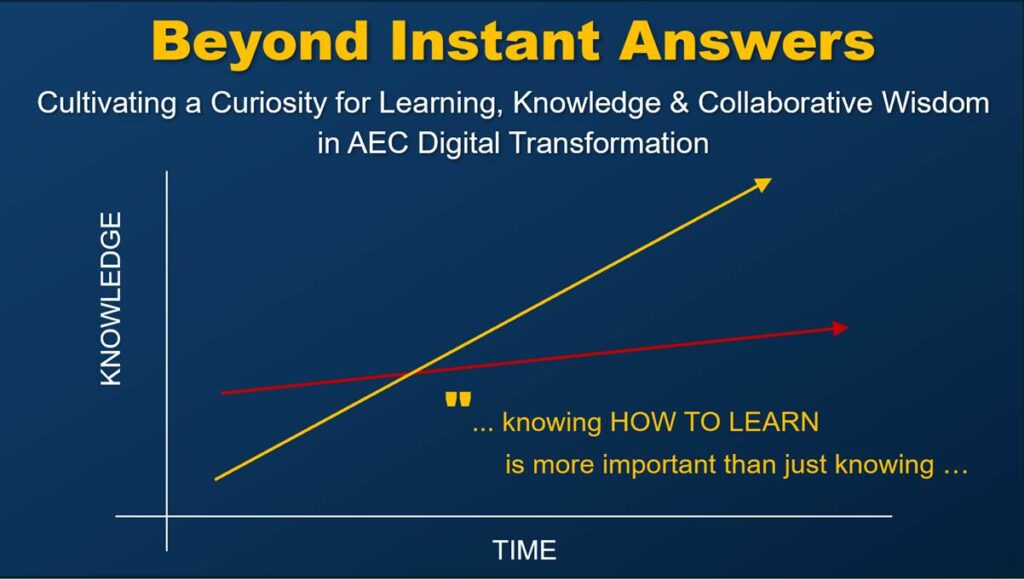Cultivating a Curiosity for Learning, Knowledge & Collaborative Wisdom in AEC Digital Transformation
We’re living in an era where information is more accessible than ever, but at the same time, a seductive temptation has taken root: “why bother learning?”. Why invest deeply in learning when any fact, figure, or process seems just a search query or an AI prompt away? This perception seems particularly prevalent as we navigate the complexities of digital transformation in the AEC sector, and it presents a subtle yet profound challenge. It beckons us towards a state of intellectual convenience, potentially undervaluing the rigorous journey of true knowledge acquisition.
🔊 Listen to an Audio Discussion on this content byNotebookLM:
👉 See Guidance Note on Using AI as your Personal Learning Coach/Mentor
The Problem: The Allure of Instant Gratification & The Perceived Obsolescence of Deep Learning
The ease with which we can now access vast oceans of data can create an illusion of understanding. For many, especially those newer to the professional landscape or grappling with rapidly evolving digital tools, the immediate question becomes, “Why bother committing this to memory or understanding its foundational principles if it’s always available?” This sentiment is often compounded by an age-old human trait: our remarkable ability to operate in ignorance – “to figure it out as we go.” Historically, this adaptive mechanism has fuelled innovation and practical learning, although it has equally led to some disastrous mistakes. However, in today’s environment of instant, often superficial, information, this instinct can be channelled into a mere retrieval reflex. We risk settling for surface-level answers, diminishing our capacity for critical evaluation because we lack the foundational knowledge against which to judge the information presented by our ever-present digital assistants.
This environment can, in turn, erode the motivation to learn deeply. If the immediate utility of knowledge isn’t apparent, or if the fundamental “why, what, and how” of learning haven’t been clearly illuminated, the process can feel like merely “filling hard drives” with useless facts – a passive accumulation rather than an active construction of understanding. The core problem, then, is clear: in an age championing instant information, we risk devaluing and disengaging from the deeper, more effortful processes of knowledge acquisition that are essential for genuine understanding, critical thinking, and ultimately, wise action within our demanding professional sphere.
The Bridge: Unveiling the True Nature & Enduring Value of Knowledge
To counter this allure of superficiality, we must build a bridge of understanding, one that illuminates what true knowledge is and why it remains indispensable. The first pier of this bridge is the DIKW Pyramid, which elegantly distinguishes between Data, Information, Knowledge, and Wisdom. Raw data, the currency of our digital age, is merely the starting point. It transforms into Information when organized and contextualized. But the leap to Knowledge requires synthesis, comparison, reflection, and an understanding of patterns and principles. Wisdom, the pyramid’s apex, is the applied mastery of this knowledge, enabling sound judgment and effective decision-making – a far cry from simply retrieving isolated facts. This model clearly shows the journey and the transformative human effort missing if we rely solely on readily available information.

The second pier is Edgar Dale’s Cone of Experience. This framework powerfully illustrates how meaningful learning occurs. It demonstrates that passive consumption – such as reading or listening, common ways we interact with search results or basic AI outputs – leads to surprisingly poor retention and shallow understanding. In stark contrast, active learning methods like participating in hands-on workshops, designing collaborative lessons, simulating experiences, or teaching others lead to vastly superior retention and deeper, more “sticky” comprehension. Dale’s Cone validates the idea that engagement is non-negotiable for knowledge to become truly embodied.

Image Credit: Obsidian Learning
Finally, we must recognize the enduring power of internalized knowledge itself. It forms the “Velcro” to which new learning can attach; it fuels creativity by allowing us to connect disparate ideas; it enables effective problem-solving by helping us know what questions to ask and how to approach novel challenges; and it underpins the critical thinking necessary to evaluate the sea of information presented to us, and navigate our complex world. Visualizing this, one might recall a simple “Knowledge vs. Time” graph: an individual with a higher rate of learning, fueled by active and engaged processes, will inevitably surpass someone who starts with more static knowledge but learns slowly. This underscores that the process and rate of learning, not just the current quantum of knowledge, are vital bridges to future capability and professional relevance. In other words, knowing how to learn is more important than just knowing.
Aspiration: Cultivating Wise, Adaptable, Innovative Thinkers, and Thriving Learning Communities
Our aspiration, therefore, extends far beyond mere information retrieval. For the AEC sector to successfully navigate its profound digital transformation, we must aim to cultivate professionals who possess not just data, but embodied knowledge and the capacity for wisdom. We aspire to a community where individuals can apply their understanding effectively, making sound judgments and pioneering innovative solutions.
This means fostering future-ready individuals who are critical thinkers, adept problem-solvers, and inherently adaptable – qualities born from deep, engaged learning or embodied knowledge. Furthermore, we aspire to an AEC sector where professionals see themselves as integral parts of a vibrant learning ecosystem. This ecosystem thrives on mutual exchange and robust dialogue, recognizing that the complex challenges of digital transformation cannot be solved by individuals or in silos but require collective intelligence and shared understanding. Ultimately, the goal is to reignite the joy and purpose of learning, both individually and collectively, so that it is viewed not as a burden (something we must do, but don’t really want to do), but as an empowering and intrinsically rewarding pursuit that fuels personal growth and collective advancement. We want to reignite a love for learning.
Practice: Strategies for Deep Learning and Collective Advancement in the Modern Age
Achieving this aspiration requires a conscious shift in both mindset and practice, both for individuals and for the AEC community as a whole. Something we have described elsewhere as the Heroic Stance.
Firstly, we must redefine “learning” itself, as something highly beneficial and desirable, cultivating effective habits that prioritize active engagement over passive consumption. This means consciously moving towards the “doing” parts of Dale’s Cone – participating, creating, experiencing, and teaching – and explicitly understanding the “why, what, and how” of effective learning, including metacognitive strategies to manage one’s own learning journey.
Secondly, we must foster rich dialogue and collaborative knowledge building. In the AEC professional community, it’s vital to embrace the student-teacher duality: everyone, regardless of experience, is simultaneously a learner and a potential teacher. No one holds all the answers, especially in a rapidly evolving field, and everyone possesses unique experiences and insights worth sharing. This mindset underpins a culture of continuous learning. We must promote active dialogue – through forums, project reviews, communities of practice, and informal discussions – over the mere passive consumption of information or the top-down dissemination by a few experts. Through such open dialogue, shared ideas are rigorously tested, refined, and either elevated or respectfully set aside. This fosters constructive feedback loops, significantly reduces the risk of echo chambers, and cultivates a collective “swarm intelligence” – the ability of a group to converge on insightful and robust solutions, as distinct from an unthinking “herd mentality.” This collective capacity is indispensable for making sound, innovative decisions during periods of profound digital transformation.
Thirdly, we must leverage Artificial Intelligence wisely, particularly as the new “one-to-one mentor” and a tool for inquiry. LLMs and other AI tools, when approached correctly, can be powerful allies. They can offer personalized learning experiences, allowing individuals to explore complex ideas at their own pace, ask foundational questions in a safe environment, and build initial understanding. However, the effectiveness of these tools hinges on the skill of “good prompting.” Recalling that AI often acts as a reflection of the user, the ability to formulate clear, specific, context-rich questions, to iterate on queries, and to critically evaluate the AI’s output becomes a crucial learning practice in itself.
Fourthly, we must embrace the challenge of “zero-to-one” learning as a path to refined self -discovery, self-reliance and deep mastery. Coined by evolutionary biologist Bret Weinstein, it the AI debate, this refers to the profound learning that occurs when an individual is presented with a novel problem and must develop a solution from scratch, without explicit instruction or guidance. This taps into our innate human drive to “figure things out” but channels it into a more demanding, focused, and ultimately more rewarding context than simple information retrieval. It forces deep engagement, fosters resilience in the face of setbacks, cultivates true innovation, and leads to knowledge that is not just understood but deeply embodied. And once understood, it needs to be shared and communicated back to the community, to contribute to the collective knowledge. That is the mastermind effect.
These principles translate into practical steps for individuals, communities, and leaders within the AEC sector. Individuals should cultivate relentless curiosity, actively seek out diverse learning experiences (both solitary and collaborative), hone their ability to engage effectively with AI tools, practice metacognition, actively participate in professional dialogue, and be open to both sharing their expertise and learning from their peers. Particularly relevant is the Art of Writing – a form of structured thinking – formulating complex ideas into understandable narratives that can be shared (as text or speech). AEC communities, in turn, must actively create platforms and a safe supportive culture that encourage this open dialogue, facilitate peer-to-peer mentorship, and allow for the critical yet constructive evaluation of new ideas, especially those related to digital transformation. Educators, researchers, and leaders have a responsibility to design learning experiences and community interactions that are inherently active, problem-based, encourage profound engagement, and explicitly foster these crucial dialogic and self-directed learning skills.
Conclusion: The Path Forward
In conclusion, while the digital age has democratized access to information on an unprecedented scale, it has also underscored the irreplaceable value of deep, internalized knowledge and the active processes required to attain it. For the BIM Heroes, as AEC professionals standing at the vanguard of digital transformation, the challenge and opportunity are clear. It is not enough to merely access data; we must cultivate understanding, foster wisdom, and build a collaborative culture of continuous learning. The future of our industry will be shaped not by those who can simply find answers quickly, but by those who can think critically, solve complex problems creatively, learn effectively from and with each other, and apply collective knowledge wisely, using all available tools with discernment, active engagement, and a shared purpose. Dynamic collaborations start when knowledgeable professionals enter into collaborative learning.
👉 Read More about the FREE BIM Heroes CPD Learning Programmes Here



